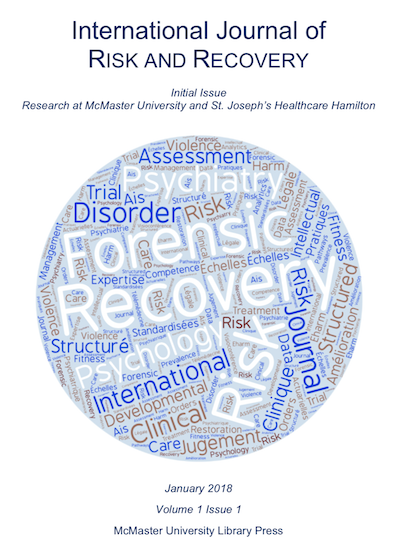Point prevalence of adults with intellectual developmental disorder in forensic psychiatric inpatient services in Ontario, Canada
DOI :
https://doi.org/10.15173/ijrr.v1i1.3355Résumé
A significant minority of people with Intellectual Developmental Disorder (IDD) may come into contact with the criminal justice system as a result of criminal behaviours, and many of these who are deemed Unfit to stand trial or Not Criminally Responsible (NCR) will be transferred to forensic psychiatric facilities. Although the perception is that the frequency is increasing, the exact number is unclear, prompting us to conduct a provisional survey of forensic facilities across the province of Ontario to determine (i) point prevalence of IDD and (ii) the characteristics of such individuals. Detainees with IDD were identified in forensic mental health facilities across the Province of Ontario, and information was collected regarding their demographics, characteristics of their index offence and length of stay. We calculated a point prevalence (December 2012) of 19%, and identified that individuals with IDD stayed, on average, longer in these facilities than their non-IDD peers. We argue for the need to set up a working group to begin to address forensic care pathways for adults with IDD
Références
2. Lindsay WR, Hastings RP, Beech AR. Foren-sic research in offenders with intellectual and developmental disabilities 1: prevalence and risk assessment. Psychol Crime Law 2011;17(2):3-8
3. Brown BS, Courtless TF. The mentally retard-ed offenders. Washington DC, USA: National Institute of Mental Health, Centre for Studies of Crime and Delinquency, 1971
4. Denkowski GC, Denkowski KM. The mentally retarded offender in the state prison system: Identification, prevalence, adjustment, and rehabilitation. Crim Justice Behav 1997;12(1):55-70
5. Lunsky Y, Gracey C, Koegl C, Bradley E, Durbin J, Raina P. The clinical profile and ser-vice needs of psychiatric inpatients with intel-lectual disabilities and forensic involvement. Psychol Crime Law 2011;17(1):9-23
6. Puri BK, Lekh SK, Treasaden IA. A compari-son of patients admitted to two medium se-cure units, one for those of normal intelli-gence and one for those with learning disabil-ity. Int J Clin Pract 2000;54(5):300-305
7. American Psychiatric Association. Diagnostic and Statistical Manual of Mental Disorders, Volume 5. Washington DC, USA: American Psychiatric Publishing, 2014
8. American Psychiatric Association. Diagnostic and Statistical Manual of Mental Disorders, Volume IV. Washington DC, USA: American Psychiatric Publishing, 1994
9. Hilton NZ, Harris GT, Rice ME, Lang C, Cormi-er CA, Lines KJ. A brief actuarial assessment for the prediction of wife assault recidivism: the Ontario domestic assault risk assess-ment. Psychol Assess 2004;16(3):267-275
10. Mossman D. Predicting restorability of incom-petent criminal defendants. J Am Acad Psy-chiatry Law 2007;35(1):34-43
11. Hauser MJ, Olson E, Drogin EY. Psychiatric disorders in people with intellectual disability (intellectual developmental disorder): forensic aspects. Curr Opin Psychiatry 2014;27(2):117-121
12. Gudjonsson GH, Britain G. Persons at risk during interviews in police custody: the identi-fication of vulnerabilities. London, UK: HM Stationary Office, 1993
13. Royal College of Psychiatrists (UK). Forensic care pathways for adults with intellectual dis-ability Involved with the Criminal Justice Sys-tem. London, UK: Royal College of Psychia-trists, 2014
14. Wheeler JR, Clare IC, Holland AJ. Offending by people with intellectual disabilities in com-munity settings: a preliminary examination of contextual factors. J Appl Res Intellect Disa-bil 2013; 26(5):370-383
15. Lindsay WR, Carson D, Holland AJ, Taylor JL, O'Brien G, Wheeler JR. The impact of known criminogenic factors on offenders with intel-lectual disability: previous findings and new results on ADHD. J Appl Res Intellect Disabil 2013; 26(1):71-80
Téléchargements
Publié-e
Comment citer
Numéro
Rubrique
Licence
Copyright Notice
Authors who publish with this journal agree to the following terms:
- Authors retain copyright of their work and grant the International Journal of Risk and Recovery the right of first publication with the work simultaneously licensed under a Creative Commons Attribution License. This allows others to share the work with an acknowledgement of the work’s authorship and initial publication in this journal.
- Authors are able to enter into separate, additional contractual arrangements for the non-exclusive distribution of the journal’s published version of the work (e.g., post it to an institutional repository or publish it in a book) with an acknowledgement of its initial publication in this journal.
- Authors are permitted and encouraged to post their work online (e.g., in institutional repositories or on their websites) before and during the submission process as it can lead to productive exchanges, as well as earlier and greater citation of published work. (See The Effect of Open Access.)

